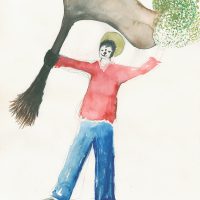The Studio Gallery’s last exhibition before the summer vacation showcases two works by the ex-artist’s collective (Anikó Loránt and Tamás Kaszás), which have never been exhibited in Budapest before. The organic/mechanic wooden structures (Amphibian and Famine Foods) built in the gallery space show us two micro-worlds that are in themselves miniature spaces of exhibition, education and living.
Here Comes the Folk Science! examines the blurring of boundaries between such spaces: the wooden structures function as living places and centers of education that use exhibition displays to give insight into survival techniques for the crisis we are all facing. The exhibition is therefore organized around the concepts of crisis – collapse – survival.
The works of Tamás Kaszás and Anikó Loránt deal with methods of survival on both a theoretical and a practical level, and also examine the conflict between these two attitudes, while focusing attention on the relevance of the almost forgotten folk science.
Following the text by F. Markatos, the artists highlight the issue of giving the right to create and explore (both in an artistic and in a scientific fashion) back to everyday people. They treat experimentation and invention as anthropological instincts that become key terms in a period of rebuilding after crisis.
Folk science can thus be understood as the sum of knowledges that can be accessed and generated by anyone and that are not motivated by the novelty-fetish of a centrally organized science, but by the more playful and sustainable logic of individual and communal (re)discovery.
*F. Markatos // http://ruganegra.uw.hu/text/markatos.htm
